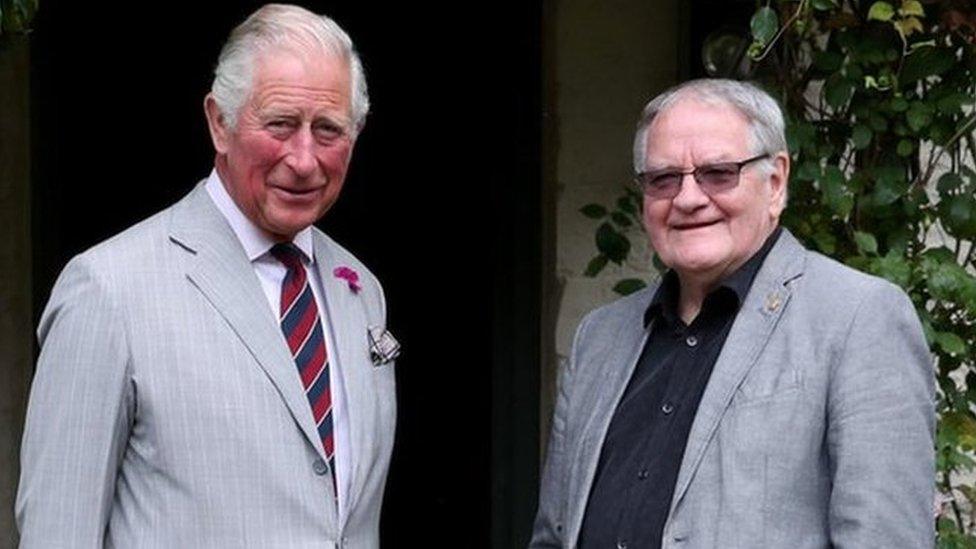Veteran singer praises Kneecap as he bows out after 60 years
Yma O Hyd provided a renaissance late in Dafydd Iwan's career as it was embraced by Wales' football fans
- Published
"Kneecap is a tremendous phenomenon."
Praise from an octogenarian Welsh folk singer for a hard-edged hip-hop trio, one of whom is facing terrorism charges, might seem incongruous to a casual observer.
But that folk singer is Dafydd Iwan and, over the course of his 60-year career, has been no stranger to controversy, protest and the wrong side of the British legal establishment himself.
From Welsh language rights campaigner, to prison, politics and renaissance as a football anthem hero with Yma O Hyd, Iwan has carried his love for Wales into all aspects of the country's heritage.
But that long singing career is drawing to its close - on Saturday, the eve of his 82nd birthday - Iwan will perform his last gig with his band at the Llanuwchllyn Festival in Gwynedd - the place where he lived as a young teen and first picked up a guitar.
Like many Welsh speakers, his first experience of performing came at the eisteddfodau - Welsh music, poetry and dance festivals held all over the country.
In his early 20s he was given a slot on a Welsh TV programme and released his first recording in 1965.
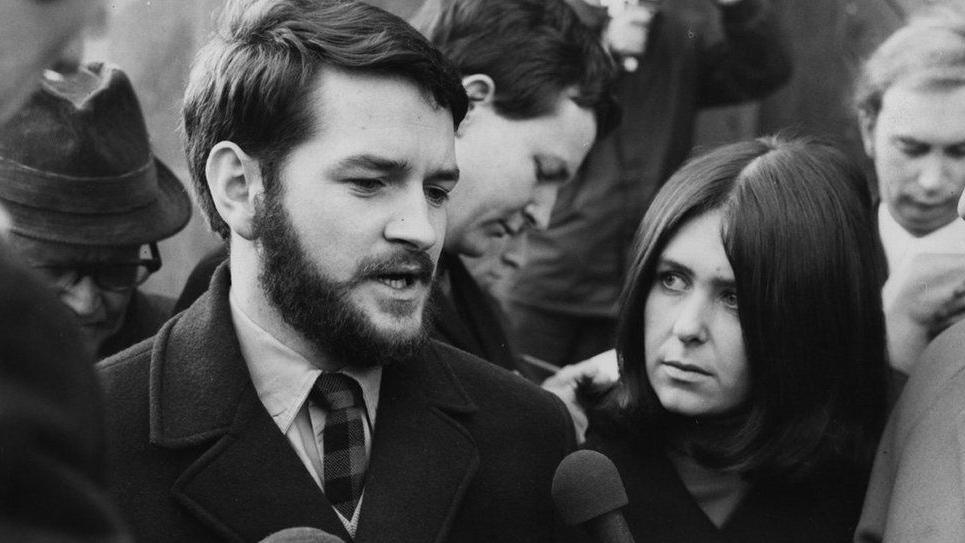
Dafydd Iwan pictured in 1970 being released from a jail term for defacing English-language road signs
His first songs were translations of 1960s American folk singers such as Woody Guthrie and Bob Dylan, but he moved into writing his own music and lyrics.
Alongside music came the activism.
He was chairman of the Welsh-language society Cymdeithas yr Iaith Cymraeg in the late 1960s and spent three weeks in prison after refusing to pay fines for defacing English-only road signs.
The dream of Welsh independence has long been part of Iwan's worldview.
His grandfather was one of the founders of Welsh nationalist party Plaid Cymru and an early expression of that was the satirical protest song Carlo, written in opposition to the investiture of Prince Charles as Prince of Wales in Caernarfon Castle in 1969.
He chaired Plaid Cymru from 1982 to '84, later becoming the first vice-president in 2001 and then president from 2003 to 2010.
He was also a councillor for Gwynedd's local authority for more than 20 years.
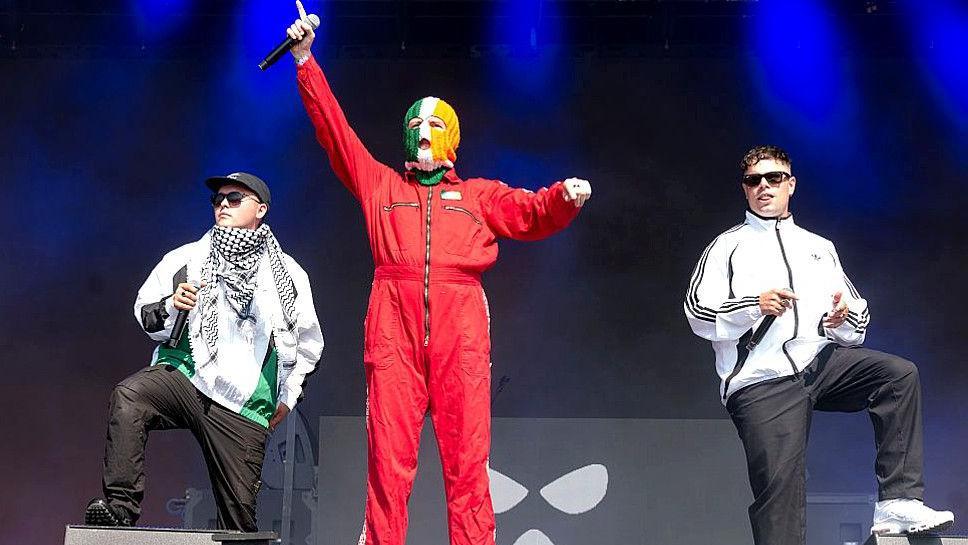
Kneecap, seen here at Glastonbury, have caused controversy in some quarters through their support for Palestine while performing
But it is the music which has defined him in the public's eye and the importance of using song as a vehicle for change that remains paramount in his eyes.
"Songs today are not so openly campaigning but they have messages. They always will have," he said.
"The rap tradition is very much a political thing and rappers find it easier to express their political feelings.
"I think it's healthy for young people especially to create songs which express their feelings about Wales and their feelings about the future."
Then he comes to Kneecap, the Belfast rappers who seamlessly move from Irish to English in their music.
"They say that they have had inspiration from what has happened in Wales [regarding the language] and they have united a lot of people in Northern Ireland and throughout Ireland from all persuasions, even unionists, to support the Irish language.
"They do things in the Irish language without thinking it's anything out of the ordinary and they enjoy it, and use it with a political message.
"I think it's a great thing because there are languages all over the world that are in danger and we must work together and strengthen each other in the fight to keep our traditions going."
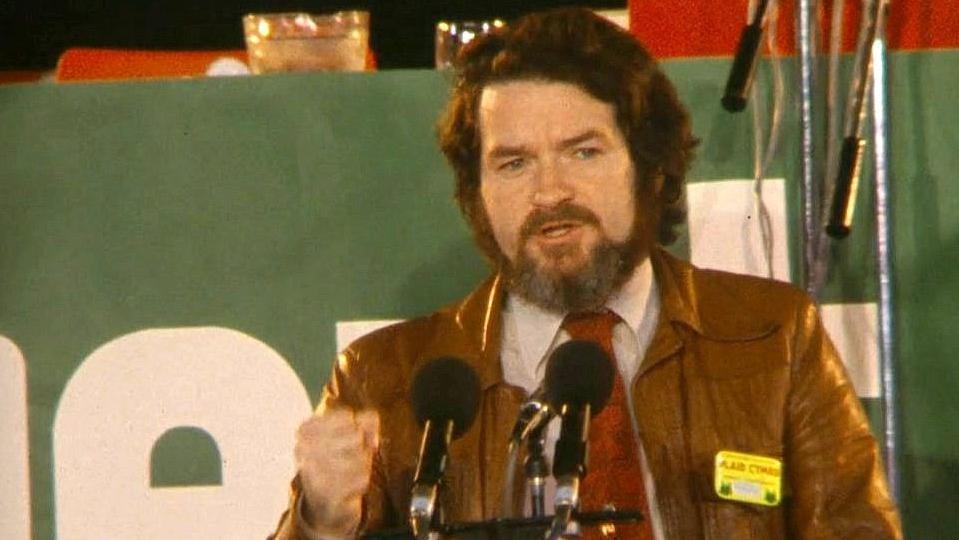
Politics, protest and singing have always gone hand in hand for Dafydd Iwan, pictured here at Plaid Cymru's 1980 conference
There is a sense of handing over the torch as his time in the spotlight is ending.
"I'm getting on in years and this singing business is a strange thing. You can carry on until it's too late. I've had a feeling for some time that I had to manage the exit.
"Saturday night will see the last performance with a band."
He does, however, admit he will still sing "the odd song here and there" but wants to stop the big gigs "before they get the better of me".
"I'll miss it and I'll probably miss the injection of adrenaline that you get in a good gig so I'll have to take something instead of it," he jokes.
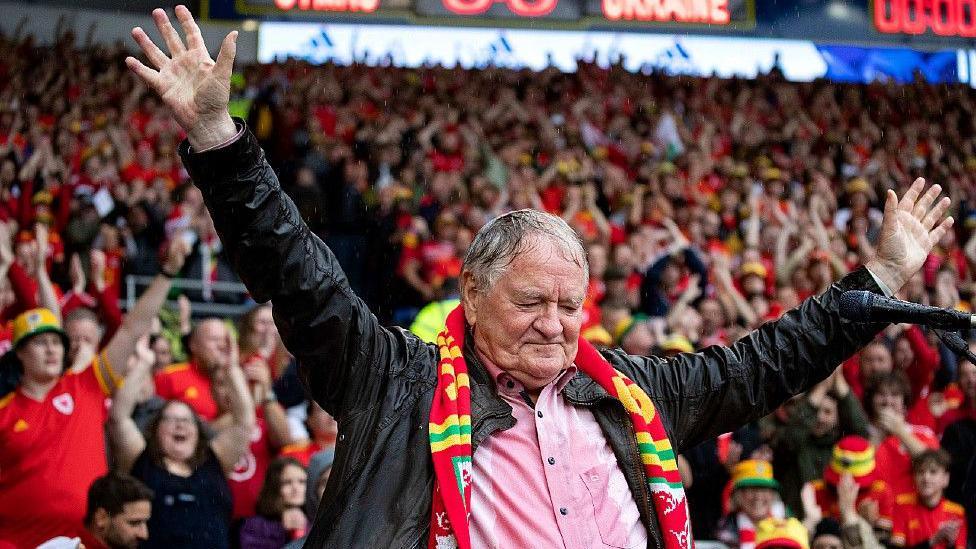
Dafydd Iwan at Cardiff City Stadium, singing to the fans who came to watch Wales take on Ukraine to get to the 2022 World Cup
Although he is [mostly] leaving the stage, his has not been a slow fade away.
Thanks to the enormous popularity of his 40-year-old song Yma O Hyd [Still Here], which was organically adopted by Wales' football fans and endorsed by the Football Association of Wales as Cymru's official song for the 2022 World Cup.
It saw Iwan perform the song in front of a packed Cardiff City Stadium as Wales first took on Austria and then Ukraine to secure a spot in their first World Cup finals since 1958.
The song thrust him firmly back in the limelight, in many cases to a new, younger, and non-Welsh speaking audience.
"The idea of singing Yma o Hyd at matches was something which I was a bit fearful of, but prepared to try, and it worked a treat.
"I didn't expect that. The reaction and participation of the crowd was tremendous.
"It has changed things for me, especially as far as non-Welsh speakers are concerned.
"It's a great feeling of bringing them into the fold."
He said the language has the power to unite people, but can also divide.
"It can keep us apart but if [the song] has helped to bring people together, I'm happy.
"Singing it in the stadium in Cardiff before those matches really struck a chord. Hearing the Red Wall, external singing back to me really brought tears to my eyes. I thought, 'this is a great feeling'.
"They are part of my song and part of my feelings."
Finally, with a smile on his face, he adds: "They haven't asked me back since then. Perhaps it's better to leave it at that."
Related topics
- Published24 August 2023
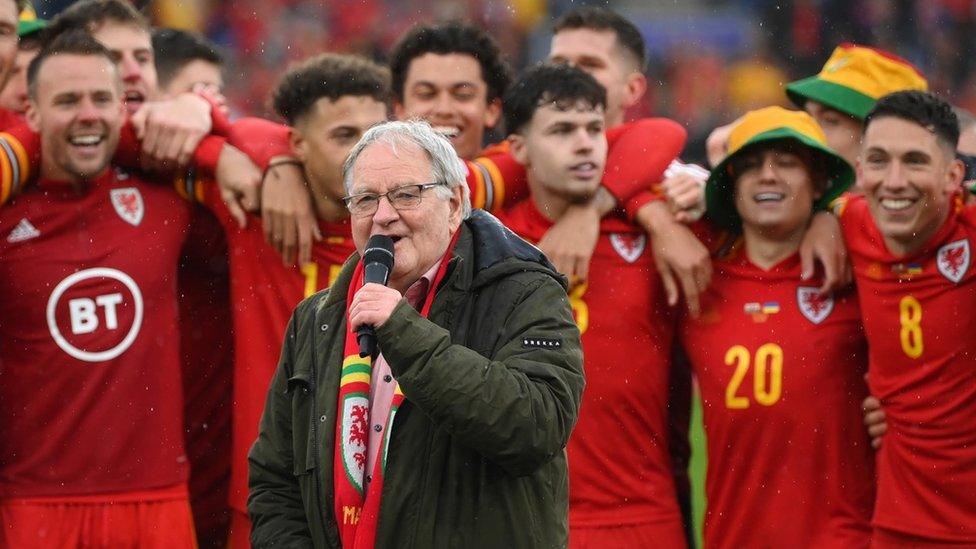
- Published8 November 2022
- Published7 July 2019
